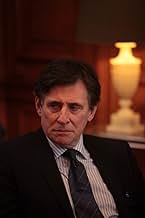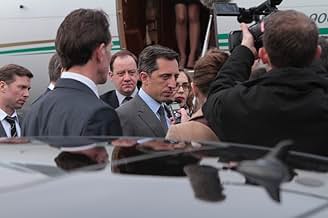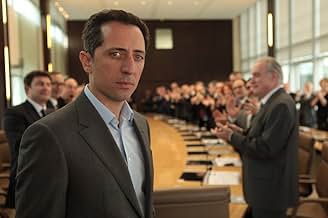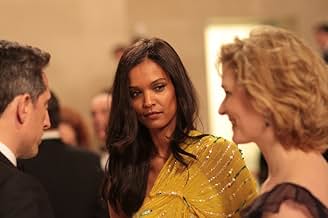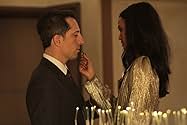AVALIAÇÃO DA IMDb
6,5/10
5,8 mil
SUA AVALIAÇÃO
O novo CEO de um gigantesco banco de investimento europeu trabalha para manter o seu poder quando uma empresa americana de fundos de cobertura tenta comprar a sua empresa.O novo CEO de um gigantesco banco de investimento europeu trabalha para manter o seu poder quando uma empresa americana de fundos de cobertura tenta comprar a sua empresa.O novo CEO de um gigantesco banco de investimento europeu trabalha para manter o seu poder quando uma empresa americana de fundos de cobertura tenta comprar a sua empresa.
- Direção
- Roteiristas
- Artistas
- Prêmios
- 1 vitória e 2 indicações no total
Avaliações em destaque
It's interesting that Costa-Gavras chose to make a personal diatribe against finance through his "Capital" since he's most renowned for his politically-oriented themes that contributed to such memorable movies as "Z" or "Missing". I say 'interesting' because "The Capital" reminded me of another finance-themed film from another political director: Oliver Stone's "Wall Street", THE movie that summed up the inner amorality of finance through the iconic : 'Greed, for a lack of better word, is good'
I wasn't surprised that the political director made his cinematic "J'accuse" against finance, since it proved to be true ruler of our liberal world, whose only alibi for existence is to pretend there's no better alternative. After the economical crisis, the Goldman Sachs and Bernard Madoff' cases, after the French President claimed to have made finance his enemy, finance was definitely political matter, and if Costa-Gavras makes a film about it, it's certainly worth our attention. The question is: what would the film show that "Wall Street" didn't? (and this comes from someone who didn't even watched its sequel, "The Wolf of Wall Street" or "Margin Call", not yet)
I expected the most overused clichés from "The Capital", the young ambitious yuppie (Gad El Maleh) riding a fast ascension, his discovery of a world of corruption, lust and greed, ethical dilemmas, probable redemption etc. And the casting of Gad El Maleh didn't comfort my thoughts. Gad (as he's generally called) is one of the most popular comedians in France, but his transition from stage to cinema didn't bring much positive results. His "Chouchou" and "Coco", both cinematic adaptations of popular sketches were critically panned, much more; Gad never really struck as a serious comedian, and was never considered an equal to Jean Dujardin or Vincent Cassel, to give you an idea.
Then I looked at the trailer and was already cringing at his crisped face, he was obviously trying to inhabit the gravity of the subject by playing the tough-guy, and if it doesn't work for Di Caprio, it's even worse for him. The trailer gave away the most archetypal situations, the corrupt bankers, the cynical American, the sexy top-model, the fast-paced editing and the obligatory round trips between Paris, New York, London and Tokyo. I really didn't expect much, and watching the film was almost accidental. The film was a commercial bomb, and even Gad's popularity didn't help, or were people tired of the subject? I guess I wanted to see where I would stand for, and my expectations were so low they could only be positively contradicted.
The first good point relies on the straight-forward narrative, Marc Tourneuil (Gad El Maleh) is not the Boy Scout that would make a perfect puppet for his hierarchy: he understands the malevolent schemes behind his nomination as a CEO of Phenix bank, replacing the former, cancerous President. He knows he has the opportunity of a lifetime to win money and be the master of his own actions. That's a first deviation from the usual 'selling-soul-to-the-devil' plot and it was quite refreshing to see a character who already embraced the cynicism of his environment. The film turns immediately into a chess game involving Tourneuil, the board members, the head of an American hedge fund (Gabriel Byrne), and in a zero-sum game, we expect only one winner.
Indeed, it doesn't take a MBA degree to understand the plot, complex but not contrived. In a nutshell, it's all about finding the tricks to distract the French government from a plan of mass-layoffs in order to increase Phenix' profitability, there are many cases of insider trading, of political maneuvers, fiscal exits and such expectable lines as 'money never sleeps'. The film tries to cover every aspect of finance, succeeding by not making it feel too forced or cliché. However, this owes more to the story than the acting or the script. Gad delivers a fine performance but there are moments where his character didn't exactly know what to do, and I suspect it was the actor lacking the right direction. Gad proved to be an actor of fair capabilities and his performance alternates between some powerful outbursts to awkward lines' deliveries where he's never totally Gordon Gekko, and can't convince as a Buddy Fox.
It's regrettable because Costa-Gavras had the material for a good film, not the most subtle one, but for a gripping thriller and fair entertainment. Yet he polluted it with some unnecessary subplots such as a dull romance with a top model. The film skates over the difficult compatibility between Marc's job and his private life, there are some moments with his wife and his family that could have been fueled with more energy and self-questioning, after all, wouldn't we be interested to see a businessman with a family, for once he's not the lone wolf, young and single. Marc's wife could have added more to the story, allowing her to deviate from "Wall Street" formula but she was too underdeveloped and it's only between Gad and Byrne that the script revealed its few strengths.
Now, I'm more perplexed regarding the fourth-wall breaking moments. It might be a promising concept on the paper to have the protagonist address us, making us wondering if he's really enjoying or disdaining the game he's playing. I think it's up to the actor to make the thing believable or out-of-place, it worked at the ending of "Goodfellas" because Ray Liotta had that liveliness in his eyes, the intensity in the narration that immediately grabbed our attention. Gad talks in a too much laconic voice and really seems like reading lines without believing in them. Anyway, I expected more flamboyance from a modern Robin Hood.
These technical aspects highlight the flaws in the script, that mixed up the words 'insightful' and 'preachy', whether it's to tell us that finance is bad or necessary (or both), we simply wonder if there is something the film shows we didn't already know.
I wasn't surprised that the political director made his cinematic "J'accuse" against finance, since it proved to be true ruler of our liberal world, whose only alibi for existence is to pretend there's no better alternative. After the economical crisis, the Goldman Sachs and Bernard Madoff' cases, after the French President claimed to have made finance his enemy, finance was definitely political matter, and if Costa-Gavras makes a film about it, it's certainly worth our attention. The question is: what would the film show that "Wall Street" didn't? (and this comes from someone who didn't even watched its sequel, "The Wolf of Wall Street" or "Margin Call", not yet)
I expected the most overused clichés from "The Capital", the young ambitious yuppie (Gad El Maleh) riding a fast ascension, his discovery of a world of corruption, lust and greed, ethical dilemmas, probable redemption etc. And the casting of Gad El Maleh didn't comfort my thoughts. Gad (as he's generally called) is one of the most popular comedians in France, but his transition from stage to cinema didn't bring much positive results. His "Chouchou" and "Coco", both cinematic adaptations of popular sketches were critically panned, much more; Gad never really struck as a serious comedian, and was never considered an equal to Jean Dujardin or Vincent Cassel, to give you an idea.
Then I looked at the trailer and was already cringing at his crisped face, he was obviously trying to inhabit the gravity of the subject by playing the tough-guy, and if it doesn't work for Di Caprio, it's even worse for him. The trailer gave away the most archetypal situations, the corrupt bankers, the cynical American, the sexy top-model, the fast-paced editing and the obligatory round trips between Paris, New York, London and Tokyo. I really didn't expect much, and watching the film was almost accidental. The film was a commercial bomb, and even Gad's popularity didn't help, or were people tired of the subject? I guess I wanted to see where I would stand for, and my expectations were so low they could only be positively contradicted.
The first good point relies on the straight-forward narrative, Marc Tourneuil (Gad El Maleh) is not the Boy Scout that would make a perfect puppet for his hierarchy: he understands the malevolent schemes behind his nomination as a CEO of Phenix bank, replacing the former, cancerous President. He knows he has the opportunity of a lifetime to win money and be the master of his own actions. That's a first deviation from the usual 'selling-soul-to-the-devil' plot and it was quite refreshing to see a character who already embraced the cynicism of his environment. The film turns immediately into a chess game involving Tourneuil, the board members, the head of an American hedge fund (Gabriel Byrne), and in a zero-sum game, we expect only one winner.
Indeed, it doesn't take a MBA degree to understand the plot, complex but not contrived. In a nutshell, it's all about finding the tricks to distract the French government from a plan of mass-layoffs in order to increase Phenix' profitability, there are many cases of insider trading, of political maneuvers, fiscal exits and such expectable lines as 'money never sleeps'. The film tries to cover every aspect of finance, succeeding by not making it feel too forced or cliché. However, this owes more to the story than the acting or the script. Gad delivers a fine performance but there are moments where his character didn't exactly know what to do, and I suspect it was the actor lacking the right direction. Gad proved to be an actor of fair capabilities and his performance alternates between some powerful outbursts to awkward lines' deliveries where he's never totally Gordon Gekko, and can't convince as a Buddy Fox.
It's regrettable because Costa-Gavras had the material for a good film, not the most subtle one, but for a gripping thriller and fair entertainment. Yet he polluted it with some unnecessary subplots such as a dull romance with a top model. The film skates over the difficult compatibility between Marc's job and his private life, there are some moments with his wife and his family that could have been fueled with more energy and self-questioning, after all, wouldn't we be interested to see a businessman with a family, for once he's not the lone wolf, young and single. Marc's wife could have added more to the story, allowing her to deviate from "Wall Street" formula but she was too underdeveloped and it's only between Gad and Byrne that the script revealed its few strengths.
Now, I'm more perplexed regarding the fourth-wall breaking moments. It might be a promising concept on the paper to have the protagonist address us, making us wondering if he's really enjoying or disdaining the game he's playing. I think it's up to the actor to make the thing believable or out-of-place, it worked at the ending of "Goodfellas" because Ray Liotta had that liveliness in his eyes, the intensity in the narration that immediately grabbed our attention. Gad talks in a too much laconic voice and really seems like reading lines without believing in them. Anyway, I expected more flamboyance from a modern Robin Hood.
These technical aspects highlight the flaws in the script, that mixed up the words 'insightful' and 'preachy', whether it's to tell us that finance is bad or necessary (or both), we simply wonder if there is something the film shows we didn't already know.
Basically good, sympathetic, or at least, interesting characters, you can relate to and care for, encounter obstacles, have to struggle for a while, but ultimately find their way through an unfriendly or simply indifferent world. We all love this type of films. "Capital" is emphatically not one of those, but is nevertheless worthy of attention.
There is at least one character, however, who has not lost her moral compass, and still has some, albeit minuscule weight in the film: the wife of the main protagonist, a former economics professor, and now an ambitious CEO of a leading French bank. Her pull on her husband, however, is only marginally stronger than the one that his extended family, of apparently modest means, has on him. He has feelings for her, as well as for his parents, but those simply cannot compare in intensity to the thrill of money. He is a man who understands "the way the world functions", as he is not shy to explain when questioned. It is a game, in which, typically, rich get richer and poor get poorer, but the reverse is not impossible, as we are told, only improbable. He is cool, calculated, unemotional player, consciously going for high stakes. Just like the others, towards him often inimical characters, who he does not blame for their repugnant behaviour, although certainly would not mind occasionally smashing their heads onto hard surfaces nearby. Of course, we understand that he could not have possible been any different and still belong to the top executive branches of the financial world.
Costa Gavras made his name in the genre of international political thriller, picking his subjects to be the most promising themes for such a film at a given time. It is already telling that he chose the world of high finance, and not of politics, as the most relevant field today. Indeed, the main character is addressed always as "the president", and he is treated as such by everybody he meets. He clearly lives in an entirely different world from the majority of even western, relatively well-off humanity, and his decisions, although made explicitly and exclusively for the benefit of the few, indeed affect, thousands of ordinary mortals. The bank that he directs, and pretty much all the interiors he ever dwells in do not fall far behind many European royal palaces. His world is the world of excess, but in his book it should be unapologetically so.
There is a hint in the film of a possible difference between the old European, and the new aggressive, American business attitudes, that may exist only on the surface. American bankers that we meet maybe cannot pronounce Modigliani's name correctly, but they understand perfectly that their French counterparts are just as greedy, and motivated by the same basic predatory impulses, as they are. As the main character says on one occasion, almost defending his adversaries across the Atlantic: "They are just businessman, like us". The difference seems to be only that the French operate from the high-ceiling, well decorated, old world Parisian buildings, whereas their American partners for their machinations prefer flashy yachts and skyscrapers.
The film certainly lacks the depth and the emotion of the very best Gavras' works, such as "Z" or the "Missing", but it functions well at the level of well written, competently shot, and expertly directed financial drama. It is an insightful, if not too original, commentary on today's state of affairs which to many will ring painfully true. There are also some fairly obvious flaws: the parallel thread with the "super model" that the main hero relentlessly pursues is rather stereotypical, and her attitude towards him appears far-fetched. It would have served the story's development better if the relationship with the multi-dimensional French female employee from London's office was introduced earlier and then further developed. This could have added some intellectual and emotional depth to the main character, beyond what was this way left only sketched. These comments notwithstanding, the film presents an entertaining and informative look at the dynamics of the modern world's new nobility.
There is at least one character, however, who has not lost her moral compass, and still has some, albeit minuscule weight in the film: the wife of the main protagonist, a former economics professor, and now an ambitious CEO of a leading French bank. Her pull on her husband, however, is only marginally stronger than the one that his extended family, of apparently modest means, has on him. He has feelings for her, as well as for his parents, but those simply cannot compare in intensity to the thrill of money. He is a man who understands "the way the world functions", as he is not shy to explain when questioned. It is a game, in which, typically, rich get richer and poor get poorer, but the reverse is not impossible, as we are told, only improbable. He is cool, calculated, unemotional player, consciously going for high stakes. Just like the others, towards him often inimical characters, who he does not blame for their repugnant behaviour, although certainly would not mind occasionally smashing their heads onto hard surfaces nearby. Of course, we understand that he could not have possible been any different and still belong to the top executive branches of the financial world.
Costa Gavras made his name in the genre of international political thriller, picking his subjects to be the most promising themes for such a film at a given time. It is already telling that he chose the world of high finance, and not of politics, as the most relevant field today. Indeed, the main character is addressed always as "the president", and he is treated as such by everybody he meets. He clearly lives in an entirely different world from the majority of even western, relatively well-off humanity, and his decisions, although made explicitly and exclusively for the benefit of the few, indeed affect, thousands of ordinary mortals. The bank that he directs, and pretty much all the interiors he ever dwells in do not fall far behind many European royal palaces. His world is the world of excess, but in his book it should be unapologetically so.
There is a hint in the film of a possible difference between the old European, and the new aggressive, American business attitudes, that may exist only on the surface. American bankers that we meet maybe cannot pronounce Modigliani's name correctly, but they understand perfectly that their French counterparts are just as greedy, and motivated by the same basic predatory impulses, as they are. As the main character says on one occasion, almost defending his adversaries across the Atlantic: "They are just businessman, like us". The difference seems to be only that the French operate from the high-ceiling, well decorated, old world Parisian buildings, whereas their American partners for their machinations prefer flashy yachts and skyscrapers.
The film certainly lacks the depth and the emotion of the very best Gavras' works, such as "Z" or the "Missing", but it functions well at the level of well written, competently shot, and expertly directed financial drama. It is an insightful, if not too original, commentary on today's state of affairs which to many will ring painfully true. There are also some fairly obvious flaws: the parallel thread with the "super model" that the main hero relentlessly pursues is rather stereotypical, and her attitude towards him appears far-fetched. It would have served the story's development better if the relationship with the multi-dimensional French female employee from London's office was introduced earlier and then further developed. This could have added some intellectual and emotional depth to the main character, beyond what was this way left only sketched. These comments notwithstanding, the film presents an entertaining and informative look at the dynamics of the modern world's new nobility.
LE CAPITAL is an interesting film to compare with Martin Scorsese's WOLF OF WALL STREET, released a year later. Both contain similar subject-matter (the rapacity of the modern-day banking world) inspired by recent events in major financial centers such as London, Paris and New York. Nonetheless Costa-Gavras' film works much better as an indictment of contemporary greed as compared to Scorsese's. There are several reasons for this: unlike Leonardo DiCaprio in the Scorsese work, Marc Tourneuil (Gad Elmaleh) is a genuinely unsympathetic central character. His expression (in public, at least) seldom changes as he ruthlessly consolidates his position as CEO of Phenix Bank, a Paris-based institution with aspirations to participate on the world stage. Anyone getting in his way is ruthlessly brushed aside; even those who support him in his quest for power are not exempt. His personal life is treated equally ruthlessly - although married to Diane (Natacha Régnier), he shows no scruples in his relentless pursuit of supermodel Nassim (Liya Kebede), even though she strings him along with equal ruthlessness. At the same time Marc is well aware that he is putting on an act; there are several moments where he uses voice-over to communicate his true feelings to the audience, and he sometimes addresses them direct to camera. He is nothing more than a prisoner of ambition; in the dog-eat-dog world of high finance, he has to play the game, however much he dislikes it. Sometimes LE CAPITAL does seem a little over-moralistic in tone - the sequences involving tyro banker Maud Baron (Céline Sallette)(who sacrifices a promising career in Phenix Bank's London office in order to expose the corruption lurking beneath a proposed business deal) tend to be rather static, especially the one taking place next to the Seine, where Maud invites Marc to give up his money-dominated existence and pursue the path of righteousness. On the other hand Costa-Gavras' film makes intelligent use of modern technology: much of the communication, especially between Marc and his US-based patron Dittmar Rigule (Gabriel Byrne) is done via videophone. This strategy indicates how debased the financial world has become; no one favors face-to-face talk anymore, but would rather put a screen in front of them, that can be switched off at will. The narrative of LE CAPITAL unfolds swiftly, making intelligent use of high-tech locations in London, Paris and New York. Its subject might be familiar, but its impact remains powerful.
Marc Tourneuil (Gad Elmaleh) is an ambitious executive of the French Phenix Bank. When the CEO becomes incapacitated with cancer, he handpicks Tourneuil as the replacement CEO. He's surrounded by enemies. When he starts pushing to be more than a figurehead for the old CEO, he even loses that support. The only support comes from an American hedge fund minority shareholder Dittmar Rigule (Gabriel Byrne). The problem is that his support comes with strings attached. There is also underwear supermodel Nassim that has caught the eye of the married Tourneuil.
This starts off well. I like the corporate intrigue and the paranoid backstabbing. Some of the arguing from the wife and their family does border on naivety. I like the morally dubious protagonist better. However the movie slips as it tries to shoehorn a Hollywood happy ending. It would be better to keep a noir edge to the end. The last half has too many simplistic turns. I would be much happier with a murkier darker progression.
This starts off well. I like the corporate intrigue and the paranoid backstabbing. Some of the arguing from the wife and their family does border on naivety. I like the morally dubious protagonist better. However the movie slips as it tries to shoehorn a Hollywood happy ending. It would be better to keep a noir edge to the end. The last half has too many simplistic turns. I would be much happier with a murkier darker progression.
Le Capital follows the course of a newly-appointed CEO of a hypothetical major French bank with global reach. The protagonist is a smart, ambitious and hard-nosed executive, but the constant pressures he faces at the helm of Phenix Bank from his board, which didn't favor his taking command but feel they can control him, from his employees who are unclear as to the direction in which he wants to take Phenix Bank compared to his cancer-stricken predecessor, and most keenly from his shareholders, particularly a U.S.-located hedge fund, almost want to make you sympathize with him. But his ruthless, hard character and the cold but correct way he treats his family ultimately prevents this identification. (I've read that the actor portraying the CEO is a comedian on French television so this must be quite a switch for him.)
The heart of the film is the pressure that the American hedge fund, as represented by a character who would put Gordon Ghecko to shame, places on the CEO to initiate drastic actions to pump the stock price. Apparently, the hedge fund has acquired a dominant position in Phenix's stock that enables it to virtually dictate policy to the bank, or at least to this CEO. Of course the dictation is smoothed by the fact that he's promised huge bonuses to implement these "suggestions". The initial directive is to fire 10,000 of the bank's employees which he does gratified by the promised bonus and seemingly unconcerned by the fact that "his" bank does not appear to have an excess labor force. The final "directive" is for Phenix Bank to make an acquisition of a troubled Japanese bank with poor assets. At last some resistance begins to form in our CEO because he senses he'll be the "fall guy" for such an ill-advised acquisition and that the adverse impact of such an acquisition on Phenix's stock price would apparently enable the hedge fund to acquire complete control of the bank at a cheaper price. (One could nitpick and say that the filmmakers in their anti-capitalist bias are confusing corporate raiders who do hostile takeovers with hedge funds who are content to be "activist" investors and prod the company's management and not manage the company. Moreover, why would the hedge fund want to manage the troubled assets of the Japanese bank as part of the larger Phenix Bank, particularly if they were acquired with cash most likely burdening Phenix Bank with much increased debt? A stock-for-stock exchange might affect the target bank's shareholders with a lower value for their stock.) What the CEO ultimately does about the Japanese bank and his erstwhile hedge fund friends I'll leave for those who choose to view this film. I, for one, enjoyed it. I found the banking scenes to be interesting and the characterizations to be provocative although in some cases over the top. For non-French speakers like this English speaker, I think you'll need to go back a bit a number of times on a DVD to refresh the sub-titles in order to follow the financial ramifications of the plot.
The filmmakers' attitude toward high-finance capitalism is most apparent in an amusing but over-the-top scene where our banking CEO says in an opulent boardroom among well-dressed board members that our new paradigm is to "rob from the poor and give to the rich" to which he's met with enthusiastic applause. I'm sure the vast majority of bankers don't believe this or follow this goal explicitly; however, their actions may sometimes indeed perform this transfer of wealth, e.g., the LIBOR interest rate manipulation which served to enrich banks and their usually wealthy shareholders (but also including 401k holders) but increased the cost to homeowners with variable-rate mortgages. I would guess the basic question underlying films like "Capital" is whether economic systems like capitalism promote the kind of greed and exploitation we see in "Capital" or whether greed-filled and exploitative people perform their misery in any kind of system (for you socialists out there, socialism did not really end greed and exploitation; it was just manifested in another form, the form of political power and perks). Perhaps the filmmakers' message is that financial capitalism allows monetary greed to be more fully realized.
The heart of the film is the pressure that the American hedge fund, as represented by a character who would put Gordon Ghecko to shame, places on the CEO to initiate drastic actions to pump the stock price. Apparently, the hedge fund has acquired a dominant position in Phenix's stock that enables it to virtually dictate policy to the bank, or at least to this CEO. Of course the dictation is smoothed by the fact that he's promised huge bonuses to implement these "suggestions". The initial directive is to fire 10,000 of the bank's employees which he does gratified by the promised bonus and seemingly unconcerned by the fact that "his" bank does not appear to have an excess labor force. The final "directive" is for Phenix Bank to make an acquisition of a troubled Japanese bank with poor assets. At last some resistance begins to form in our CEO because he senses he'll be the "fall guy" for such an ill-advised acquisition and that the adverse impact of such an acquisition on Phenix's stock price would apparently enable the hedge fund to acquire complete control of the bank at a cheaper price. (One could nitpick and say that the filmmakers in their anti-capitalist bias are confusing corporate raiders who do hostile takeovers with hedge funds who are content to be "activist" investors and prod the company's management and not manage the company. Moreover, why would the hedge fund want to manage the troubled assets of the Japanese bank as part of the larger Phenix Bank, particularly if they were acquired with cash most likely burdening Phenix Bank with much increased debt? A stock-for-stock exchange might affect the target bank's shareholders with a lower value for their stock.) What the CEO ultimately does about the Japanese bank and his erstwhile hedge fund friends I'll leave for those who choose to view this film. I, for one, enjoyed it. I found the banking scenes to be interesting and the characterizations to be provocative although in some cases over the top. For non-French speakers like this English speaker, I think you'll need to go back a bit a number of times on a DVD to refresh the sub-titles in order to follow the financial ramifications of the plot.
The filmmakers' attitude toward high-finance capitalism is most apparent in an amusing but over-the-top scene where our banking CEO says in an opulent boardroom among well-dressed board members that our new paradigm is to "rob from the poor and give to the rich" to which he's met with enthusiastic applause. I'm sure the vast majority of bankers don't believe this or follow this goal explicitly; however, their actions may sometimes indeed perform this transfer of wealth, e.g., the LIBOR interest rate manipulation which served to enrich banks and their usually wealthy shareholders (but also including 401k holders) but increased the cost to homeowners with variable-rate mortgages. I would guess the basic question underlying films like "Capital" is whether economic systems like capitalism promote the kind of greed and exploitation we see in "Capital" or whether greed-filled and exploitative people perform their misery in any kind of system (for you socialists out there, socialism did not really end greed and exploitation; it was just manifested in another form, the form of political power and perks). Perhaps the filmmakers' message is that financial capitalism allows monetary greed to be more fully realized.
Você sabia?
- Erros de gravaçãoIn a dinner scene towards 67 minutes into the film, the liquid level in a bottle in front of Marc Tourneuil keep on changing between shots.
- Citações
L'oncle Bruno: Your bank makes money and you lay people off. How do you cope?
Principais escolhas
Faça login para avaliar e ver a lista de recomendações personalizadas
- How long is Capital?Fornecido pela Alexa
Detalhes
Bilheteria
- Faturamento bruto nos EUA e Canadá
- US$ 101.700
- Fim de semana de estreia nos EUA e Canadá
- US$ 22.400
- 27 de out. de 2013
- Faturamento bruto mundial
- US$ 4.822.849
- Tempo de duração
- 1 h 54 min(114 min)
- Cor
- Mixagem de som
- Proporção
- 2.35 : 1
Contribua para esta página
Sugerir uma alteração ou adicionar conteúdo ausente






